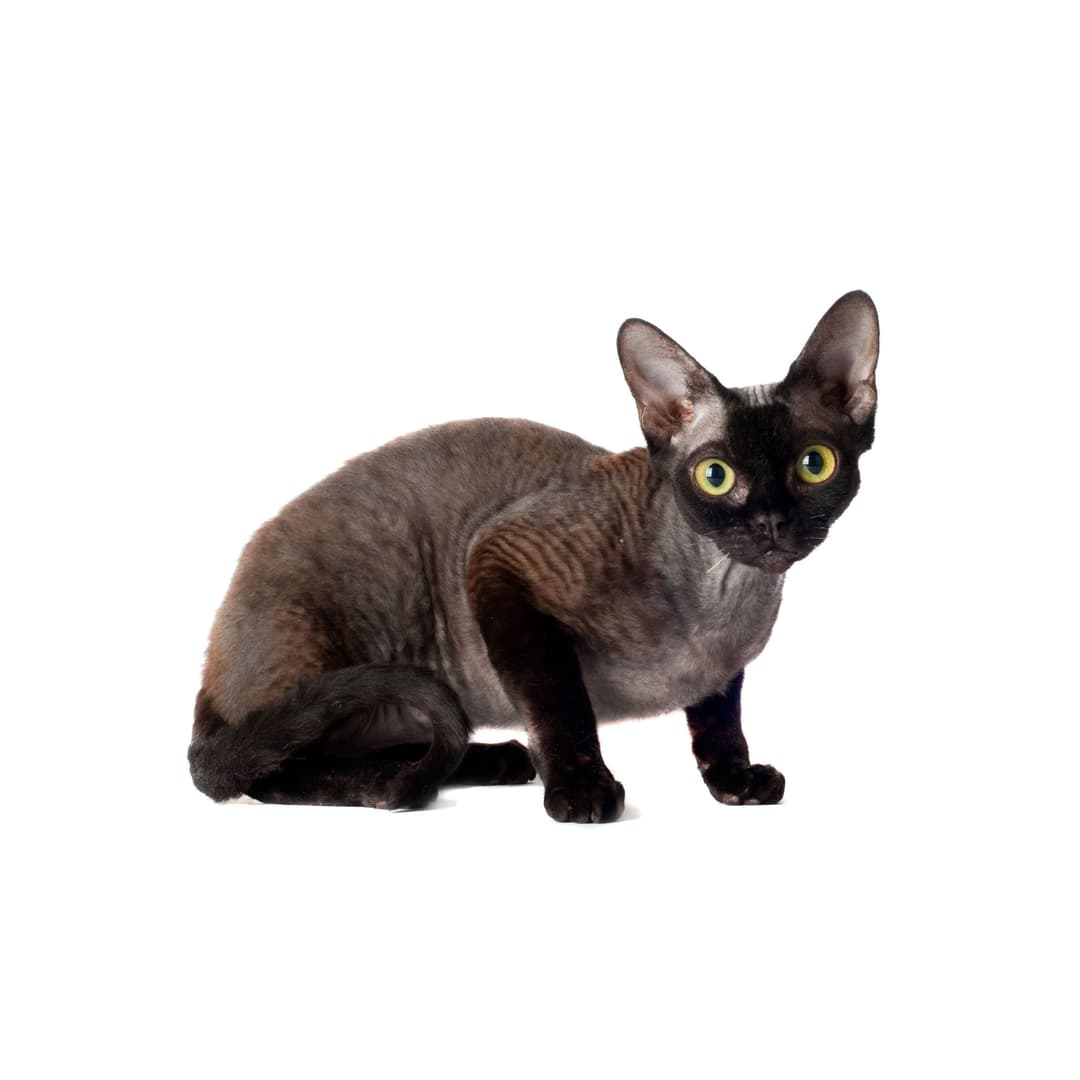Discover your cat's connection to this breed and 20 others


Discover your cat's connection to this breed and 20 others



Meet the Devon Rex, aka the "Alien Cat"! Known for its prominently large eyes and curly coat, the Devon Rex is a beautiful kitty adored for its playfulness and cuddliness. There is never a dull moment with these fur-riendly bundles of joy! In honor of their unique appearance, they also acquired affectionate the nickname of the "Pixie Cat".
The Devon Rex is a medium-sized, uniquely beautiful kitty. They have lightly built bodies, long, sturdy legs, and large toes. They are purr-fectly suited for jumping and leaping. The Devon Rex typically weighs 6-11 pounds and measures around 13 inches. They have exceptionally large, slightly rounded ears. The head is wide and the nose is slightly upturned. Their whiskers are unusually short and often curled to such an extent that it may appear as if they have no whiskers at all. Their coat is short, curly, and plush, without any undercoat. They come in a variety of colors and patterns, except amber.
The story of the alien cat begins in an abandoned tin mine in Buckfastleigh, Devon, England in 1959. This is where a lady named Beryl Cox discovered and adopted a homeless little curly cat who she named Kirlee. Kirlee was produced from a male curly cat and a female shorthair tortoiseshell cat, and he was the only curly kitten in his litter. Fascinated by his prominent appearance, Beryl was determined to mate her special little cat in order to create a new cat
breed and preserve his unusual looks. She first attempted to cross Kirlee with another curly breed, the Cornish Rex, in hopes to produce more curly kittens. However, it turned out that the curly coat trait of Kirlee and the Cornish Rex is determined with completely different genes, so the cross-breeding was unsuccessful. So, instead, Kirlee was bred with domestic cats and then inter-bred to his curly female kittens.
The curly kittens were then continued to be bred to each other and the new breed was born. Because the breed originated from just one single cat, Kirlee, the World's first Devon Rex, this resulted in a poor genetic pool of the breed and puts the breed at a higher risk for some genetic diseases.
Mischievous, playful and intelligent, the Devon Rex remains a "kitten-at-heart" even into their senior years. Devons are lovable kitties who love cuddling and snuggling, but, frankly, they
never get tired of getting into trouble. They love playing, exploring, fetching, and hunting. When they're not jumping, climbing or making a mess, your Devon Rex may be found looking out the window or spying on you from the shadows.
In light of this, they are sometimes called "monkeys in a catsuit". They are extremely friendly and people-oriented, but because they're also exceptionally playful and mischievous, they get along better with older children rather than younger. They are known to be welcoming to other pets and slow introductions and healthy socialization always helps the process.
While the Devon Rex can be fairly healthy, due to the small gene pool, there is a higher incidence of some genetic diseases. These conditions include hip dysplasia, patellar luxation, vitamin-k-dependent coagulopathy (a deficiency of blood clotting factors), and myasthenia (an autoimmune neuromuscular disease).
Their curly coat has a unique genetic make-up. Although they have a similar coat structure, the curl in Devon Rex fur is actually caused by a completely different mutation and gene than that of the Cornish Rex and German Rex. In fact, the breeding of a Devon
with either of those cats results in cats without rexed (curled) fur.
They are NOT hypoallergenic. Because they have a short, slow-growing coat, it is a common misconception that the Devon Rex is hypoallergenic. This is because allergic reactions to cats are caused by the allergens produced in cat saliva, and not the hair itself.
They are easily trainable. The Devon Rex is highly intelligent, which is why they can learn a lot of different tricks. You can teach them to walk on a leash, to fetch, to pee in the toilet, whatever you name it. But don't expect this job to always be easy! Even though they are very smart and social, it can be challenging to motivate the Devon Rex, we've got some tips that can help you train your kitty.
There are only two blood groups in the Devon Rex population. Because of a small genetic pool, only two blood groups can be found in this breed. This underscores the importance of blood testing before breeding these cats to prevent neonatal isoerythrolysis.
Their ears are large and a bit high-maintenance. The Devon Rex has large, sensitive ears and it is recommended that you clean them weekly to prevent dirt accumulation. If you let your Devon outside during the summer days, it is recommended that you put kitty-safe sunscreen on their sensitive skin of their large, exposed ears.
The International Cat Association (TICA) “Introduction to the Devon Rex”
Recommended by top vets with decades of experience
21 breeds
64 genetic health markers
50 genetic trait markers
